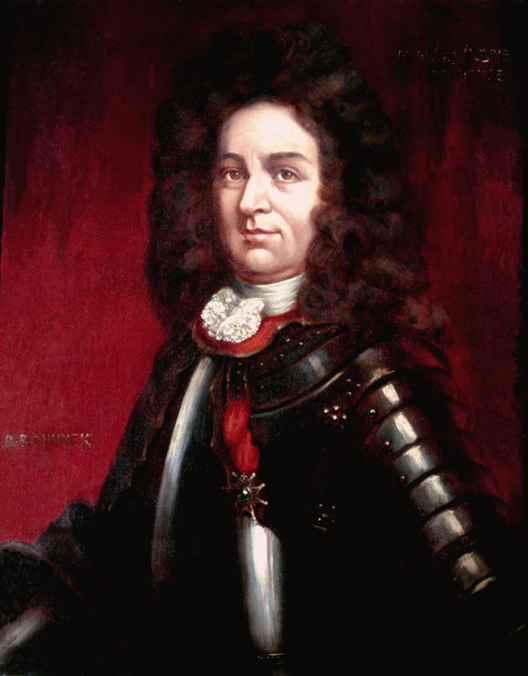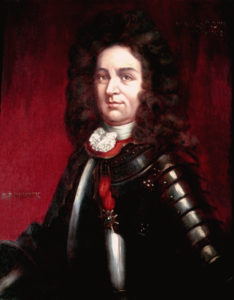Pierre Le Moyne, sieur d’Iberville
Pierre Le Moyne, sieur d’Iberville, Canadian soldier and explorer, is often described as the founder of the first permanent French settlement in Louisiana.

Courtesy of Louisiana State Museum
Pierre Le Moyne d'Iberville. Bohunek, Rudolph (Artist)
Pierre Le Moyne, sieur d’Iberville, Canadian soldier and explorer, is often described as the founder of the first permanent French settlement in Louisiana. After a prestigious and lengthy career with the military in New France, Iberville traveled on an expedition that arrived in Louisiana in 1699. With his younger brother Jean-Baptiste Le Moyne, sieur de Bienville, Iberville explored the lower Mississippi River Valley and established Fort Maurepas, near present-day Ocean Springs, Mississippi. In the late sixteenth and early seventeenth centuries, Iberville made repeated trips between the lower Mississippi River Valley and France, playing a crucial role in establishing the new colony.
Early Life
Pierre Le Moyne was born in the frontier village of Montreal, the third son of Catherine Thierry and Charles Le Moyne, on July 16, 1661. He was educated in the Sulpician seminary of Montreal. With the permission of Governor Louis de Buade, Comte de Frontenac, Iberville served as a midshipman in the French navy during his teenage years.
The incorporation of Hudson’s Bay Company by British royal charter in 1670 led to heightened tension between French and British interests in New France. Fifteen years later, Iberville and two of his brothers assumed positions of command in Chevalier de Troyes’s expedition against British posts on Hudson Bay. In 1687, Iberville took command of the fast-sailing craft Soliel d’Afrique with orders to collect furs on behalf of the Company of the North. A year later, the governor of New France made Iberville commander-in-chief of all French posts on Hudson Bay. The following year, France declared war on England, starting what came to be known as King William’s War (1689-1697). Iberville participated in the massacre of approximately sixty British settlers at Corlaer (later called Schenectady) in 1690 and the capture of Port Nelson in 1694, followed by a merciless and lucrative expedition against British posts throughout Newfoundland in 1696. Pursuant to the recapture of Port Hudson in 1697, Iberville and his crew aboard the Pelican defeated three British ships, further solidifying his reputation as one of the French Crown’s most able military commanders in New France.
First Louisiana Expedition
During his service in Hudson Bay, Iberville developed an interest in fulfilling René-Robert Cavelier, sieur de la Salle’s failed mission to colonize the lower Mississippi Valley. Jerome Phélypeaux, Comte de Maurepas, the Minister of Marine, appointed Iberville for the task. Four of his brothers—Joseph de Sérigny, Gabriel d’Assigny, Antoine de Châteauguay, and Jean-Baptise Le Moyne, sieur de Bienville—would also make the trip to Louisiana. In 1698, Iberville left Brest, France, aboard the Badine and arrived at Santo Domingo before making a brief stop in Pensacola Bay and finally anchoring in Mobile Bay on January 31, 1699. Iberville made contact with Bayogoula and Mougoulacha Indians in the vicinity of Mobile Bay, where he demonstrated an exceptional ability to conduct diplomatic relations with native groups. On February 27, Iberville led a group of Canadians on a small craft expedition in search of the Mississippi River, which he located at 28° 50’ north on March 2.
The contents of Iberville’s journals, now published, provide a detailed account of early French exploration of the lower Mississippi Valley. Iberville and his European companions journeyed up the Mississippi River for eleven days before reaching a Bayogoula and Mougoulacha village. In his journals and letters, Iberville described the customs, ceremonies, rituals, and modes of living common to native inhabitants of southern Louisiana. On March 17, Iberville’s party noticed a pole stained with a red substance and adorned with fish and bear parts marking the territorial divide between the Bayogoula and the Houma. Locals supposedly called the pole Istrouma, which, when translated into French, meant Baton Rouge (red stick).
Iberville’s first trip up the Mississippi River did not produce a permanent French settlement. Instead, on April 8, he chose to build Fort Maurepas at a point near the entrance of Biloxi Bay because of its suitable depth and easy shipping access. Iberville placed sieur de Sauvole in command of the fort and made his brother Bienville his lieutenant. He left for France on May 3, leaving behind approximately seventy men with six months of provisions.
Second Louisiana Expedition
Iberville’s second expedition, which included the forty-six-gun frigate Renommée and the seven-hundred-ton flute Gironde, left La Rochelle, France, on October 17. Paul du Ru, a Jesuit priest, and Louis Juchereau de Saint-Denis, the future founder of the French post at Natchitoches, were among the crew that would ultimately arrive at Biloxi on January 8, 1700. While Iberville was away, Sauvole and Bienville explored the environs of Mobile Bay and conducted reconnaissance on local native groups and possible places of settlement. On February 1, Iberville led a party of approximately eighty people to the Mississippi River. Du Ru wrote a journal of his experiences during the expedition, now published and available to contemporary audiences.
Iberville ordered the erection of a fort near the mouth of the Mississippi River. He also met Henri de Tonti, who had traveled from Illinois with twenty Canadians to meet Iberville. Iberville visited villages associated with the Bayogoula, Houma, and Taensa, where he attempted to curtail the advances of British traders into the Mississippi Valley. He returned to France in May.
The Final Expeditions
Iberville commanded a third and final expedition to Louisiana in December of 1701 with the intention to fortify Mobile Bay and prepare the way for permanent French settlement. He ordered the construction of Fort Louis on the present-day site of Mobile in 1702. He also met with Choctaw and Chickasaw leaders in order to develop military alliances and trade partnerships that might compete with British interests. He left Mobile in March and arrived at La Rochelle in June.
Due to illness, Iberville failed to accompany the fourth expedition of French soldiers, settlers, and supplies to Louisiana in 1703. He would never return to Louisiana. Later, in 1706, he led a squadron of ships and an expeditionary force against the British island of Nevis in the Caribbean. He contracted yellow fever during his return trip to France and died on July 9, 1706, in Havana. The site of his burial is unknown.
